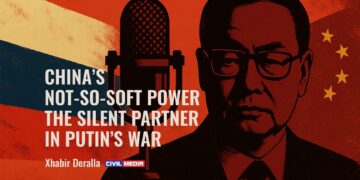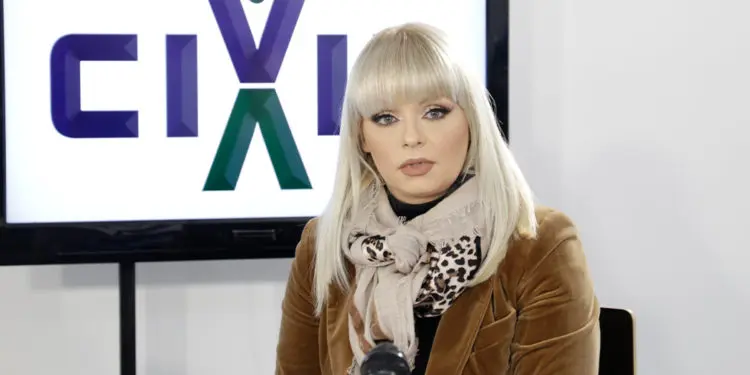CIVIL MEDIA: Let’s go back in the past a bit. You were, and still are participated as one of the leaders of women in our country, in this case, the Women’s Union of VMRO-DPMNE. In the past you have raised many initiatives, in Parliament you were also a vocal speaker and advocate for gender issues, unfortunately, not very successful, because we obviously live in a masculine society, male society. In the past you were part of a nomenclature that was around Gruevski, whose rule they call “regime” even today. You were with him on the scene many times, you also said that he had good policies. Was your political, collegiate, party relationship as it seemed on the political scene? Or was there a little more than what is called “behind the scene”, in the sense of ideological, program, and other differences.
RANGELOVA: The problem with the past leadership was only in that transparent policies were not conducted. And when we criticize, we don’t go out publically to say that, because VMRO-DPMNE has quite a strong organizational structure and everything that happens rarely comes out in the public. As to whether it was a regime…. I think very little… except for the freedom of the media, now the media are really more vocal… I think that things have changed very little in SDSM’s time. Although it is noted in the Report of the European Commission that journalists speak more freely, when you read the Report, it is also indicated that still the media depend on who finances them. That has not been solved in our country and they need to talk about everything that is in the interest of the current government. That was the biggest problem for which Gruevski’s leadership, in which I was also a part, was blamed.
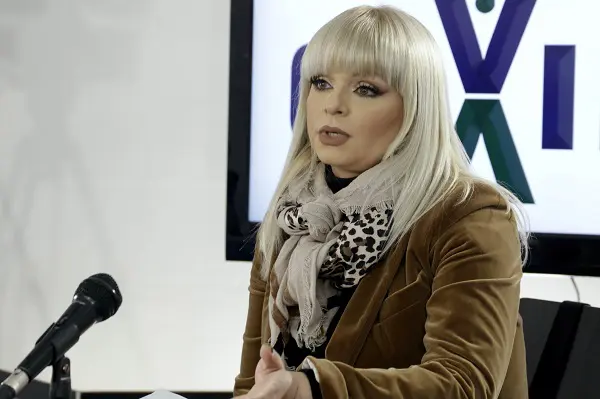
Daniela Rangelova
In regards to the kind of policies we had with Gruevski, I can say that I was able to stand up and criticized, and was not massacred for this on the social networks. People don’t believe when we tell them that Gruevski had a greater democratic capacity than Hristijan Mickoski. Because, I can publically say that when we were supposed to have 40 percent women as candidates for councilor lists, some of the colleagues from VMRO-DPMNE’s Executive Committee, who I would prefer not to name, didn’t want women to elect women, but for it to be within the framework of the committees.
I requested, and Gruevski allowed me this. And now when I make a comparison, a comparison of how we behaved them and now, I formed the executive committee of the Women’s Union by myself, without suggestions.
Gruevki never told me “appoint this woman to be part of the leadership”, unlike Hristijan Mickoski who wants to rule the party one hundred percent, and allows himself to say “it will be these and these women”.
Now, when the choice was being made for councilor lists, they carried it out in municipal committees, namely the men. Some of the women MPs who were more vocal, who didn’t agree with some policies, did not find themselves on the lists, there were very little women members of the Women’s Union on the lists. The work of women has really marginalized.
Maybe then Gruevski didn’t deal with the policies that were led by women, but I most responsibly claim that he didn’t interfere in how we would work within the party. Hristijan Mickoski wants to control the party. That’s a personality, I can’t blame him for that, but still I think that democratic capacities, no matter how different they seem from the outside, Mickoski does not have. He declaratively says that he supports women.
For me a big disappointment is that I expected things that were not good in Gruevski’s regime to improve. I cannot be exempted from that responsibility, I was part of that leadership, but we had a quota in the statute, 30 percent, now in the new statute there is no quota. It has been removed. That’s why I took this statute, to read to you.
In Article 16, there is only one sentence on the gender dimension, which reads: “VMRO-DPMNE takes into account the gender dimension and provides equal representation of women and men in the bodies of the party”. That’s it.
CIVIL MEDIA: So there nevertheless is a statutory obligation …
It’s a declarative obligation – “will take into account”. It’s statutory when there is a number and when someone has to stick to the number. Apart from all the bodies in the party, the Congress is the highest body. If they took into account in this Congress, there wouldn’t have been only 110 women of 518 delegates, which is 21 percent, which is very disappointing. Like they didn’t want to ask the women what they think on whether Hristijan Mickoski should be a leader. I don’t know what that fear of women in VMRO-DPMNE is.
I am sorry that many women are marginalized. Really quality women who are not functioning now and are not active. There is a very bad practice in the party, the membership is divided in old and new leadership. Thinking that if they remove the people, they put on a new skin, and they think, well, now we are a political party. I don’t think it’s because of the people, but rather the policies. If I were in the place of Hristijan Mickoski, I would have made a sublimate – what was not good in Gruevski’s time, I would accept what was good, and would improve or change what was bad, and would not change people.
In the party, people modify, rarely who speaks out loud and has their views. I think it would have been easy for him to work with a whole structure, not to have old and new and so on. However, every leader has responsibility for their rule. When I tell him this, he gets angry and tells me that it’s a threat. When I tell him this, he gets angry and says to me that this is a threat. And I will say this again, that is not a threat, it is a kind of sobering up, because at the end, the invoice for his actions, one day will be paid by him and the leadership, but I hope that it will not be at the expense of the party and the expense of the country.
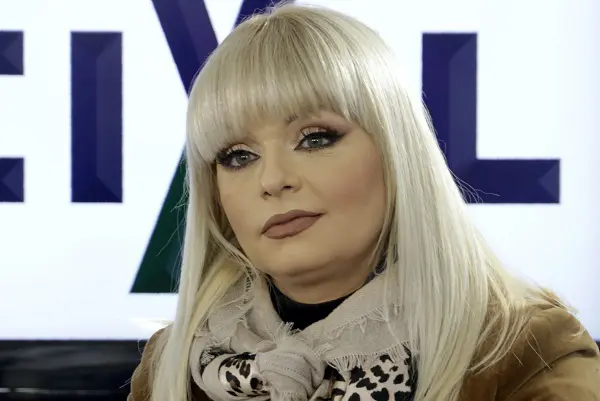
Daniela Rangelova
CIVIL MEDIA: Let’s go a bit beyond politics and relations in your party. How would you comment the current political situation in our country? We have a resignation from the Prime Minister, who also stepped back from the leader position of the party, we have other challenges, starting from the pandemic, to the energy crisis, and all the other challenges in-between. How would you asses the political situation in our country in this moment, and how do you think it will progress?
Rangelova: At this moment, firstly, as a citizen I am a bit uncertain, because there is still no government. Having in consideration how many things are happening on a daily basis, who will bear the responsibility is something happens? If a new variant of the coronavirus, so-called Omicron, is knocking on our door, and I see that measures are not being taken… Perhaps people are really fed up, and want to live their lives and go to celebrations… It’s as if leadership is lacking. And not only that. The energy crisis – yesterday I listened to Bislimovski saying that as citizens we need to be in solidarity, but this for me is irresponsible. For us to be in solidarity in order to solve the energy crisis… Neighboring countries are doing a better job in dealing.
I think that the new leadership and new Prime Minister should make a serious undertaking, serious reforms in the energy sector, as well as the health sector. It is really difficult in this Covid pandemic to talk about how they dealt with this before, and how they do now, because this disease took many victims. I think we have a problem with the capacities of the health sector, because there are not enough employees, and we have a serious problem with many health workers leaving the country. People can’t satisfy their health needs. And that is what they should be focusing on.
And most importantly, the economy. The citizens really do live badly. I think the main dissatisfaction is the living standard that was reflected at these local elections. That is why the citizens wanted to punish SDSM, because it put the main focus on foreign policy, it dealt very little with interior policy.
In regards to education – I support reforms, and I think that there should be digitalization, but not in that way, forcibly. Here, one of the bad policies of Gruevski, when he wanted to forcibly adopt the Law for Higher Education, which was then met with big protests from students.
I will say again, we should listen to the citizens, to the youth. If we stop listening to them, we deviate from the path we walk on, and we start to wander.
Some qualify Zaev’s resignation as democratic, while others as a cowardly act. I do not meddle in personal decisions, because I know how I felt when I left the party. Maybe a little ungrateful towards SDSM and the citizens, because they worked, expected, and suddenly, a resignation after local elections, when a leader is not expected to leave a party. But, Gruevski also left the party after local elections, but in a different way.
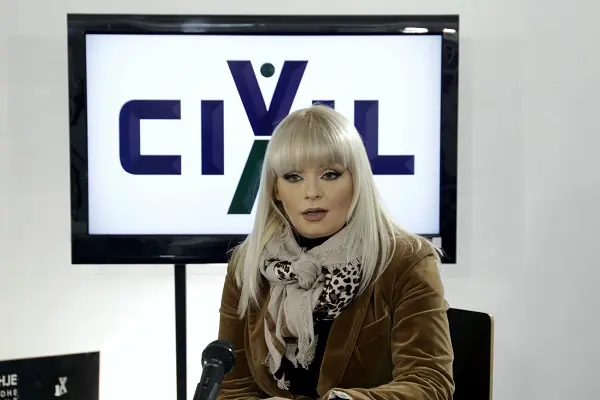
Daniela Rangelova
To me, it is all right that Zaev wants to leave politics, maybe he is tired, and when a person feels that way, they should know their limits, and no one should blame him for that. I would not even have blamed Hristijan Mickoski if he had left. I, as a citizen, cannot blame him, but the membership can, because Zaev had a certain responsibility to them, and they to him, they worked on elections etc.
Still, the decision is individual and is an act that no one from the outside can judge him for. We can say that he could have stayed, but still, he did not leave SDSM alone. Here, there is already a new president, and from what can be seen, he tidied up the government and left. Now the new president and soon – to – be Prime Minister has big challenges to face, and should really roll up his sleeves and get to work, because it depends on him and this leadership if we will have parliamentary elections.
What I like about the citizens is that they are already politically mature, they have shown that in the previous few election cycles, and even in the local elections for VMRO – DPMNE, before that the parliamentary, I am talking about the year 2017… We are already talking about politically mature citizens who know how to say no, and who know how to asses that something isn’t right, and deliver a so-called political slap, and to make the politicians aware that they are moving in a wrong direction.
We should listen to the citizens, and I appeal to all the politicians, regardless of which political party they belong to, that the citizens are those who have the last word. No matter how much it might seem that the policies they make are okay, they should turn back and see what is happening. No politician should be comfortable.
(continues)
Conversation led by: Xhabir Deralla
Camera: Atanas Petrovski
Editing: Arian Mehmeti
Text editing: Diana Tahiri
Photography: Goran Naumovski
Translation: N. Cvetkovska


